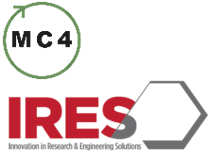The MC4 project aims at reducing the environmental footprint of composites manufacturing by offering more sustainable processes with the recycling of glass and carbon fibre composite materials. To assess this decrease in environmental impact, IRES, a sustainability consulting company and one of the MC4 project partner will evaluate the environmental and cost performance of the newly developed recycling processes and final products through LCA and LCC techniques.
But first, what does LCA and LCC stand for?
Life cycle assessment (LCA) is a widely used methodology to assess the potential environmental impacts throughout a product’s life cycle from raw material acquisition through production, use, end-of-life treatment, recycling and final disposal. It follows a four-phase framework:
- Phase I: The goal and scope definition to explain why the LCA should be done
- Phase II: The life cycle inventory (LCI) where all the resources and emissions are allocated to services/products
- Phase III: The life cycle impact assessment (LCIA) that evaluate the significance of the potential environmental impacts using the results of the LCI
- Phase IV: The interpretation of results
Life cycle cost assessment (LCC) is a valuable technique, used for predicting and assessing the cost performance of products. It takes into account cost or cash flows and targets to guide the decision-makers towards the most cost-efficient scenario at different life cycle perspectives and stages.
In the project, IRES will first perform the LCA and LCC of the current manufacturing processes used by the project partners. Then, when all of the new recycling processes will be fully developed, IRES will conduct the analysis on these new methods. These LCA/LCC will focus on assessing the environmental and cost impacts of:
- The end-of-life treatment (chemical/mechanical recycling) of composites
- The reuse of uncured glass and carbon fibre waste in product value chain
- The recycled carbon fibres used as secondary raw materials

“Funded by the European Union. Views and opinions expressed are however those of the author(s) only and do not necessarily reflect those of the European Union or the European Health and Digital Executive Agency. Neither the European Union nor the granting authority can be held responsible for them.”
